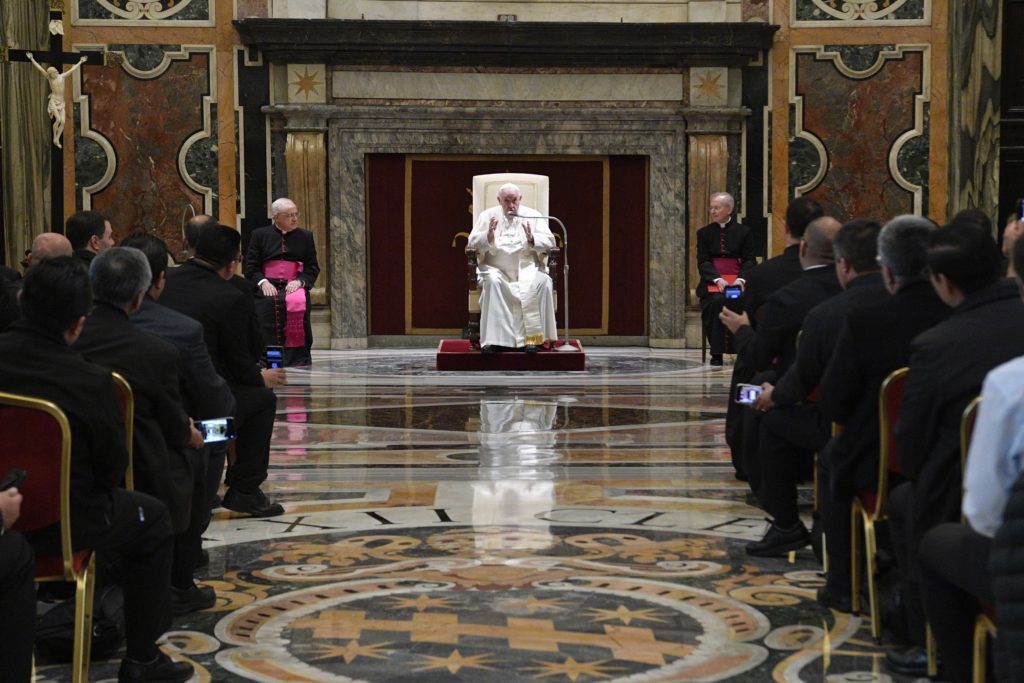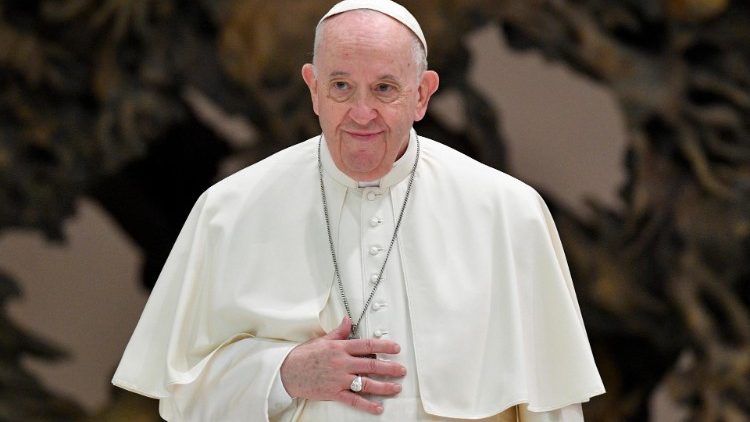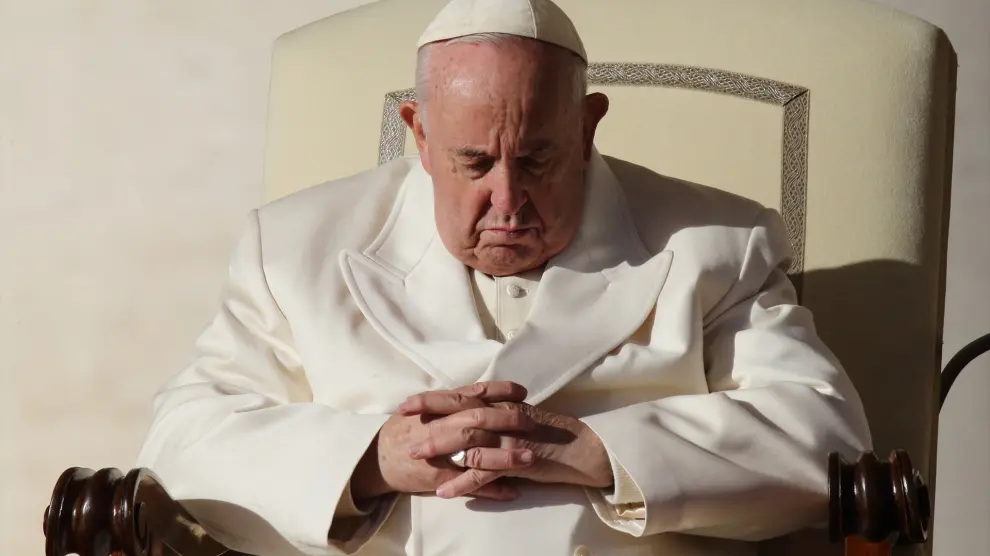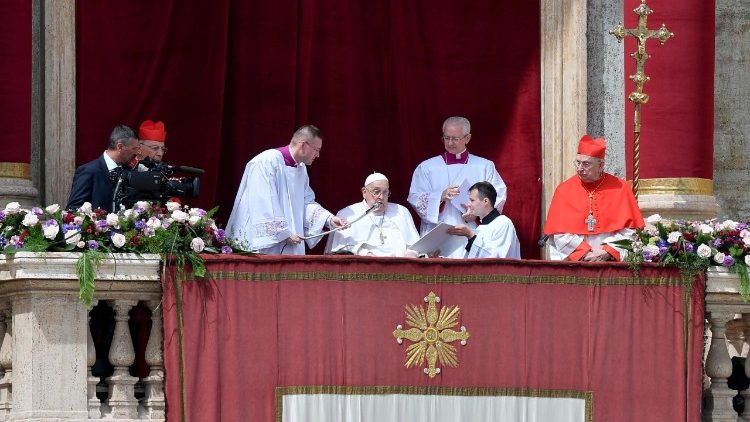Leaving behind “inertia and protagonism” and beginning to “dream together”
Address of the Holy Father to the participants in the Course for Rectors and Trainers of Latin American Seminaries

This morning, in the Vatican Apostolic Palace, the Holy Father Francis received in Audience the participants in the Course for Rectors and Trainers for Latin American Seminaries.
After delivering the speech prepared for the occasion, the Pope addressed the participants in the meeting.
We publish below the speech that the Holy Father prepared for the occasion and delivered and the speech he gave to those present at the Audience:
Address delivered by the Holy Father
Dear Cardinal,
dear brothers in the Episcopate and in the Priesthood,
Good morning!
I am pleased to greet all of you, participants in the Course for Rectors and Formators of Latin American Seminaries, from almost all the countries of the Continent and the Caribbean. I extend my greetings to the collaborators of the Dicastery for the Clergy, which organized the course.
All priestly formation, particularly that of future pastors, is at the heart of evangelization, for in the coming decades they, responding to a genuine specific vocation, will inspire and lead the holy People of God, so that it may be “in Christ as a sacrament, a sign and instrument of intimate union with God and of the unity of the whole human race”. How necessary is a quality formation for those who will be the sacramental presence of the Lord in the midst of his flock, nourishing and healing it with the Word and the Sacraments!
In this regard, I would like to underline that the Ratio fundamentalis institutionis sacerdotalis “The Gift of the Priestly Vocation” preserves the great contribution made by the Apostolic Exhortation Pastores dabo vobis, which this year marks the thirtieth anniversary of its publication by Saint John Paul II, following the Eighth Ordinary General Assembly of Bishops, which dealt with “The Formation of Priests in the Circumstances of the Present Day”. It explicitly offers an integral anthropological vision, which takes into account simultaneously and in a balanced way the four dimensions present in the person of the seminarian: human, intellectual, spiritual and pastoral. On the other hand, the same Ratio fundamentalis reaffirms the perspective of my esteemed Predecessor Pope Benedict XVI, who, with the Motu proprio Ministrorum institutio, illustrated that the formation of seminarians naturally continues in the ongoing formation of priests, the two constituting a single reality.
On the other hand, I would like to point out that one of the great contributions of the current Ratio fundamentalis is that it describes the formative process of priests, from the seminary years onwards, on the basis of four characteristic features of formation, which is presented as unique, integral, communitarian and missionary.
In this regard, I would like to pause to emphasize that priestly formation “has an eminently communitarian character from its very origin. The vocation to the priesthood, in fact, is a gift of God to the Church and to the world, a way to sanctify oneself and to sanctify others, which is not undertaken individually, but always with reference to a solid portion of the People of God” (RFIS, Introduction 3).
In this context, I would like to point out that one of the most important challenges facing houses of priestly formation today is that they should be true Christian communities, which implies not only a coherent formation project, but also an adequate number of seminarians and formators to ensure a truly communitarian experience in all the dimensions of formation. This challenge often requires a commitment to create or consolidate interdiocesan, provincial or regional seminaries. This is a task the bishops must undertake in a synodal way, especially at the level of the regional or national Bishops’ Conferences, in which you are called to collaborate loyally and proactively.
For this, dear priest formators, it is necessary to overcome inertia and protagonism and to start dreaming together, not longing for the past, not alone, but united and open to what the Lord desires today as formation for the next generations of priests inspired by the current directions of the Church.
I am glad that, during these days, you are reflecting on different aspects of initial formation, focusing on the human dimension and how it is integrated with the other dimensions, namely the spiritual, intellectual and pastoral.
Indeed, within the Christian community, the Lord calls some of his disciples to be priests, that is, he selects some of the sheep of his flock and invites them to be shepherds of their brothers and sisters. We must not forget that we priests have been “taken from among men and made their representative before God” (cf. Heb 5:1). We are “fellow-disciples” of the other Christian faithful and therefore share the same human and spiritual needs, as well as being subject to the same frailties, limitations and errors.
In seminarians, as in each one of us, two aspects interact and coexist and must be integrated reciprocally, the gifts of grace and the traits of wounded nature; the service that you have to carry out is precisely to unite both realities in a journey of faith and integral maturity (cf. RFIS, 28).
It is necessary to be attentive, for your mission is not to form “supermen” who claim to know and control everything and to be self-sufficient, but rather the opposite, it is to form men who in humility follow the process chosen by the Son of God, which is the way of the Incarnation.
Yes, by virtue of the Incarnation of the Son of God we find in our Master, God and true man, not only examples of renewed humanity to imitate, but also the possibility of entering into vital communion with Him, from which our existence is healed and raised to a new humanity. The Lord makes it possible for us to imitate him and follow in his footsteps, because he communicates to us the gift of his grace, which is capable of transforming all that we are: “soul, body and spirit” (cf. 1 Thess 5:23), according to his plan of fullness for each one of us.
The human dimension of priestly formation, therefore, is not merely a school of virtues, of growth of one’s own personality or of personal development. It implies, above all, a holistic maturing of the person empowered by the grace of God which, even assuming the biological, psychological and social conditionings of each person, is capable of transforming and elevating them, especially when the person and the communities strive to collaborate with it in a transparent and truthful way. Ultimately, authentic vocational motivations, namely, the following of the Lord and the establishment of the Kingdom of God, are at the basis of a process that is both human and spiritual.
In this sense, one of the most important tasks in the process of the formation of a priest is the gradual, faith-based interpretation of one’s own history. This providential vision of one’s own path is the principal matter of personal and ecclesial discernment of one’s vocation. Indeed, every seminarian, first of all, and then every priest, with different accents and nuances, must constantly return to this, especially at the most significant junctures of his own priestly journey (cf. RFIS, 59 and 69). The exchange with those who accompany him in this process, both internally and externally, will allow him to overcome any temptation to subjectivist self-deception and will open his evaluation to much broader and more objective perspectives.
We must also be aware of the formative impact that the life and ministry of formators has on seminarians. Formators educate by their life, more than by their words.
Certainly, a healthy human maturity consistent with the consolidation of one’s vocation and mission, which includes the normal overcoming of difficulties and periods of crisis, allows the priest formator to constantly renew the basis on which his configuration to Christ, Servant and Good Shepherd, is based, and, furthermore, confers on him the most effective tool for the exercise of his service in the Seminary, both with the candidates in relation to their discernment process, and with regard to the other formators of the formation team and the other agents of formation. Indeed, the human and spiritual harmony of the formators, particularly of the Rector of the Seminary, is one of the most important mediations in formative accompaniment.
One of the indicators of human and spiritual maturity is the development and consolidation of the ability to listen and the art of dialogue, which are naturally anchored in a life of prayer, where the priest enters into daily dialogue with the Lord, even in moments of aridity or confusion. For the service that a priest renders to his sisters and brothers, and in particular for the work of a formator, the willingness to listen and to empathize with others, more than an instrument of evangelization, is precisely the environment where evangelization germinates, blossoms and bears fruit.
In summary, the formator’s life, his constant human and spiritual growth as a disciple-missionary of Christ and as a priest, sustained and promoted by the grace of God, is undoubtedly the fundamental factor at his disposal to bring effectiveness to his service to seminarians and other priests in their configuration to Christ, Servant and Good Shepherd. In fact, his own life testifies to what his words and gestures try to convey in the dialogue and interaction with his interlocutors in formation.
Dear priests, I am aware that the service you render to the Church is not simple and often challenges your own humanity, because the formator has a heart that is one hundred percent human and that he can often feel frustration, tiredness, anger and impotence, hence the importance of turning every day to Jesus, getting down on your knees and in his presence learning from him who is meek and humble of heart, so that little by little our heart may be able to learn to beat in time with the heart of the Master.
The pages of the Gospel, especially those which offer us a sketch of the life of Jesus with his disciples, enable us to see how Jesus knew how to make himself present or absent; he knew when it was the moment to correct or when to praise, the moment to accompany or the occasion to send and let the apostles face the missionary challenge. It is in the midst of these, what we might call Christ’s “formative interventions”, that Peter, Andrew, James, John and the rest of those who were called, became true disciples and gradually conformed their heart to that of the Lord.
Earlier I emphasized the formative role of the seminary rector in relation to his brethren in the formative group and the co-responsibility of all in their own priestly formation. The rector must show constant concern for each one of the formators, maintaining an open and sincere dialogue with regard to his life and his service, without neglecting to echo those more personal aspects on which the overcoming of problems that may arise within the formative group often depends. Bear in mind that the formators are for the seminary rector his closest brothers, to whom the exercise of pastoral charity must be addressed in a privileged manner.
On the other hand, priestly formation has as its primary tool the formative and spiritual accompaniment of each and every one of the seminary formators with regard to each and every one of the seminarians, so as to ensure that they receive broad and varied support from the community of formators, without exclusivism or particularism, being able to be supported by priests of different ages and sensitivities, according to the specific skills of each one, so that each future pastor can discern and consolidate not only a genuine vocation to the priesthood, but also the personal and unrepeatable way that the Lord has traced out for them to live and exercise it.
Other people contribute to the formative accompaniment of seminarians, helping them in their human and spiritual growth. The agents responsible for pastoral experiences during initial formation, especially parish priests, as well as experts who are called upon to collaborate when necessary, should be remembered (cf RFIS, nos. 145-147).
Dear formators, I once again express the Church’s gratitude to you for dedicating your lives and your ministry to the future pastors, who will be your brothers in the presbyterate and who, united and under the guidance of the bishop, will cast the nets of the Gospel as authentic fishers of men. May Mary Most Holy, Mother of priests, encourage you and keep you in your mission.
Have a good afternoon and I ask you, please, not to forget to pray for me. Thank you.
_______________________________________________
Holy See Press Office Bulletin, 10 November 2022
© Vatican Publishing Bookshop
Related

More than a Decade of Service, Reform, and Hope
Exaudi Staff
21 April, 2025
4 min

The Pontificate of Pope Francis: A Leadership of Compassion and Renewal for the Church
Exaudi Staff
21 April, 2025
3 min

Pope Francis has died
Exaudi Staff
21 April, 2025
2 min

Pope Francis Calls for Global Peace in His Easter Message
Exaudi Staff
20 April, 2025
2 min
 (EN)
(EN)
 (ES)
(ES)
 (IT)
(IT)

